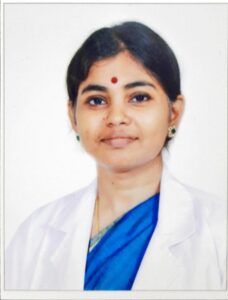
Chennai, February 1, 2023: “Annual eye tests for cancer are important, especially for people with genetic predispositions and those who are subjected to prolonged UV exposure, for the early detection and treatment of cancers of the eyes. Eye tests can also detect cancer in blood and other body parts including skin, lungs, and breast, as these types of cancer can quickly spread to the eyes, because parts of the eyes are highly vascular, having a large number of blood vessels,” said Dr Dhivya Ashok Kumar, Senior Consultant Ophthalmologist, Dr Agarwals Eye Hospital, Chennai.
In a press release, issued to mark the World Cancer Day, which falls on 4th February every year, Dr Dhivya said that there is a lack of awareness among the public about the prevalence of eye cancers because their prevalence rate is comparatively low, and the eye cancers are not associated with well-known risk factors such as tobacco or alcohol consumption. “People do not think of the eyes when they think of cancer. Though eye cancers are not among the top forms of cancers, unlike the cancers of breast, lung, mouth, cervix, or tongue, their prevalence pose a significant threat to a section of the population,” she said.
Two of the most common eye cancers are retinoblastoma, the ones that affect the retina (the layer in the back of the eyes), and uveal melanoma, the cancer of uveal structure, which is the middle layer of the eyes and the source of blood flow to the ocular tissues. Retinoblastoma usually comes to children. The average age at diagnosis is 18 months. In India, one in 15,000-18,000 live births develop this form of cancer. Uveal melanoma is common among the adults – 45-55 is the average age group in which this cancer is diagnosed. It is more common in the west, not in Asia. Only one in a million Indians get it.
Talking about the at-risk population, Dr Dhivya Ashok Kumar, Senior Consultant Ophthalmologist, Dr Agarwals Eye Hospital said, “People who have a family history of eye cancer, patients with skin diseases like xeroderma pigmentosa and other forms of cancer, and the immunocompromised like the HIV infected form the majority of the at-risk group for eye cancers. Similarly, people who are subjected to prolonged exposure of high UV light and toxic chemicals also run the risk of developing eye cancers. But practically, anybody can develop eye cancer.”
On the importance of the eye tests, Dr Dhivya said that early detection is crucial for the at-risk population to save vision. “Eye tests for cancer are important when there is sudden vision loss or when there are floaters with mass inside the eyes. Tests are a must also when children or adults have unresolved issues in the eyes – pain or swelling or moles or lid ulcers that do not go away, even after treatment. In children with ‘white pupil’, it could be the result of light getting reflected off the cancer’s white surface. These are all warning signs that warrant immediate eye tests,” she added.
Dr Dhivya said that since eye tests can also reveal cancer spread from organs, routine eye checkups are important in high risk people.
“Compared to the west, the incidence rate of cancer is still low in India. It is less than 100 per 100,000 in India. However, the main challenge is the late-stage detection of cancers. About 30% of patients come to hospital with advanced cancer. In this context, regular eye tests can play its own role in bringing down the rate of late-stage detection,” she emphasised.
She said that basic eye check-ups such as ‘slit lamp examination’, a part of a routine eye exam, vision evaluation and dilated retinal examinations are often enough to detect early signs of cancer of the eyes or other organs. Special tests such as ultrasound, CT/MRI scan and OCT scan, or biopsy – besides, histopathology, a procedure to find changes in cells to understand the actual cause of the abnormality, are needed only when there is a need for further evaluation.
On the advancements in the treatment of eye cancers, Dr Dhivya Ashok Kumar, Senior Consultant Ophthalmologist, Dr Agarwals Eye Hospital said, “In the 80s, the only cure for an eye cancer was to remove the eyes. But today, it is not the case. Only in rare advanced cases, removal of the affected eye becomes unavoidable in order to save life.” When detected early, retinoblastoma can be cured successfully with laser treatment. Cryotherapy and thermotherapy, which use cold and heat respectively, are also used to get rid of retinoblastoma, when the tumour size is small. Chemotherapy is required usually when tumour are large and are present in both the eyes. “But, today, we don’t need the traditional chemotherapy. There is a recent advancement known as intra-arterial chemotherapy. It is about directing concentrated doses of cancer-killing medicine precisely to the affected area of the eye. So, there are fewer side effects. And the chances of saving the eyeballs are high.”
Dr Dhivya said and added that for uveal melanoma, localized radiotherapy like plaque therapy and brachytherapy are found to be effective – and cancers of the ocular surface and lid can be treated by surgical removal.






More Stories
SIMS Hospital Performs India’s First Combined Open-Heart Valve Replacement and TAVR Valve-Specialised Aortic Graft Surgery
Kauvery Hospital’s 24×7 Diabetes Helpline Crosses 1500 Days of Lifesaving Support Across Tamil Nadu
Apollo Cancer Centres Launches Dedicated Robotic Pancreatic Surgery Program